- Home
- W. Somerset Maugham
On a Chinese Screen Page 5
On a Chinese Screen Read online
Page 5
A poor man, but ambitious (fame, the last infirmity of noble mind) he had married for her enormous dot the daughter of a sugar broker, now a painted little lady with hennaed hair, in beautiful clothes; and it must have been a sore trial to him that when he gave her his honoured name he could not also endow her with the sense of personal pride which was so powerful a motive in all his actions. For, like many great men, M. de Steenvoorde was married to a wife who was extremely unfaithful to him. But this misfortune he bore with a courage and a dignity which were absolutely characteristic. His demeanour was so perfect that his infelicity positively raised him in the eyes of his friends. He was to all an object of sympathy. He might be a cuckold, but he remained a person of quality. Whenever, indeed, Mme. de Steenvoorde took a new lover he insisted that her parents should give him a sufficient sum of money to make good the outrage to his name and honour. Common report put it at a quarter of a million francs, but with silver at its present price I believe that a business man would insist on being paid in dollars. M. de Steenvoorde is already a man of means, but before his wife reaches the canonical age he will undoubtedly be a rich one.
XX
THE BEAST OF BURDEN
AT first when you see the coolie on the road, bearing his load, it is as a pleasing object that he strikes the eye. In his blue rags, a blue of all colours from indigo to turquoise and then to the paleness of a milky sky, he fits the landscape. He seems exactly right as he trudges along the narrow causeway between the rice fields or climbs a green hill. His clothing consists of no more than a short coat and a pair of trousers; and if he had a suit which was at the beginning all of a piece, he never thinks when it comes to patching to choose a bit of stuff of the same colour. He takes anything that comes handy. From sun and rain he protects his head with a straw hat shaped like an extinguisher with a preposterously wide, flat brim.
You see a string of coolies come along, one after the other, each with a pole on his shoulders from the ends of which hang two great bales, and they make an agreeable pattern. It is amusing to watch their hurrying reflections in the padi water. You watch their faces as they pass you. They are good-natured faces and frank, you would have said, if it had not been drilled into you that the oriental is inscrutable; and when you see them lying down with their loads under a banyan tree by a wayside shrine, smoking and chatting gaily, if you have tried to lift the bales they carry for thirty miles or more a day, it seems natural to feel admiration for their endurance and their spirit. But you will be thought somewhat absurd if you mention your admiration to the old residents of China. You will be told with a tolerant shrug of the shoulders that the coolies are animals and for two thousand years from father to son have carried burdens, so it is no wonder if they do it cheerfully. And indeed you can see for yourself that they begin early, for you will encounter little children with a yoke on their shoulders staggering under the weight of vegetable baskets.
The day wears on and it grows warmer. The coolies take off their coats and walk stripped to the waist. Then sometimes in a man resting for an instant, his load on the ground but the pole still on his shoulders so that he has to rest slightly crouched, you see the poor tired heart beating against the ribs: you see it as plainly as in some cases of heart disease in the out-patients' room of a hospital. It is strangely distressing to watch. Then also you see the coolies' backs. The pressure of the pole for long years, day after day, has made hard red scars, and sometimes even there are open sores, great sores without bandages or dressing that rub against the wood; but the strangest thing of all is that sometimes, as though nature sought to adapt man for these cruel uses to which he is put, an odd malformation seems to have arisen so that there is a sort of hump, like a camel's, against which the pole rests. But beating heart or angry sore, bitter rain or burning sun notwithstanding, they go on eternally, from dawn till dusk, year in year out, from childhood to the extreme of age. You see old men without an ounce of fat on their bodies, their skin loose on their bones, wizened, their little faces wrinkled and apelike, with hair thin and grey; and they totter under their burdens to the edge of the grave in which at last they shall have rest. And still the coolies go, not exactly running, but not walking either, sidling quickly, with their eyes on the ground to choose the spot to place their feet, and on their faces a strained, anxious expression. You can make no longer a pattern of them as they wend their way. Their effort oppresses you. You are filled with a useless compassion.
In China it is man that is the beast of burden.
"To be harassed by the wear and tear of life, and to pass rapidly through it without the possibility of arresting one's course, -- is not this pitifvl indeed? To labour without ceasing, and then, without living to enjoy the fruit, worn out, to depart, suddenly, one knows not whither, -- is not that a just cause for grief?"
So wrote the Chinese mystic.
XXI
DR. MACALISTER
HE was a fine figure of a man, hard upon sixty, I should think, when I knew him, but hale still and active. He was stout, but his great height enabled him to carry his corpulence with dignity. He had a strong, almost a handsome face, with a hooked nose, bushy white eyebrows and a firm chin. He was dressed in black, and he wore a low collar and a white bow tie. He had the look of an English divine of a past generation. His voice was resonant and hearty, and he laughed boisterously. His career was somewhat out of the common. He had come to China thirty years before as a medical missionary, but now, though still on good terms with the mission, he was no longer a member. It had been decided, it appears, to build a school on a certain desirable spot which the doctor had hit upon, and in a crowded Chinese city it is never very easy to find building land, but when the mission after much bargaining had eventually bought this the discovery was made that the owner was not the Chinese with whom the negotiations had been conducted, but the doctor himself. Knowing that the school must be built and seeing that no other piece of land was available he had borrowed money from a Chinese banker and bought it himself. The transaction was not dishonest, but perhaps it was a little unscrupulous and the other members of the mission did not look upon it as the good joke that Dr. Macalister did. They displayed even a certain acrimony, and the result was that Dr. Macalister, though preserving friendly relations with persons with whose aims and interests he was in the fullest sympathy, resigned his position. He was known to be a clever doctor and he soon had a large practice both among the foreigners and the Chinese. He started a hostel in which the traveller, at a price, and a high one, could have board and lodging. His guests complained a little because they were not allowed to drink alcohol, but it was much more comfortable than a Chinese inn, and some allowance had to be made for the doctor's principles. He was a man of resource. He bought a large piece of land on a hill on the other side of the river and put up bungalows which he sold one by one to the missionaries as summer resorts; and he owned a large store in which he sold everything, from picture postcards and curios to Worcester sauce and knitted jumpers, which a foreigner could possibly want. He made a very good thing out of it. He had a commercial bent.
The tiffin he invited me to was quite an imposing function. He lived above his store in a large apartment overlooking the river. The party consisted of Dr. Macalister and his third wife, a lady of forty-five in gold-rimmed spectacles and black satin, a missionary spending a few days with the doctor on his way into the interior, and two silent young ladies who had just joined the mission and were busily learning Chinese. On the walls of the dining-room hung a number of congratulatory scrolls which had been presented to my host by Chinese friends and converts on his fiftieth birthday. There was a great deal of food, as there always is in China, and Dr. Macalister did full justice to it. The meal began and ended with a long grace which he said in his deep voice, with an impressive unction.
When we returned to the drawing-room Dr. Macalister, standing in front of the grateful fire, for it can be very cold in China, took a little photograph from the chimney piece and showed it to me.<
br />
"Do you know who that is?" he asked.
It was the photograph of a very thin young missionary in a low collar and a white tie, with large melancholy eyes and a look of profound seriousness.
"Nice looking fellow, eh?" boomed the doctor.
"Very," I answered.
A somewhat priggish young man possibly, but priggishness is a pardonable defect in youth, and here it was certainly counterbalanced by the appealing wistfulness of the expression. It was a fine, a sensitive, and even a beautiful face, and those disconsolate eyes were strangely moving. There was fanaticism there, perhaps, but there was the courage that would not fear martyrdom; there was a charming idealism; and its youth, its ingenuousness, warmed one's heart.
"A most attractive face," I said as I returned the photograph.
Dr. Macalister gave a chuckle.
"That's what I looked like when I first came out to China," he said.
It was a photograph of himself.
"No one recognises it," smiled Mrs. Macalister.
"It was the very image of me," he said.
He spread out the tails of his black coat and planted himself more firmly in front of the fire.
"I often laugh when I think of my first impressions of China," he said. "I came out expecting to undergo hardships and privations. My first shock was the steamer with ten-course dinners and first-class accommodation. There wasn't much hardship in that, but I said to myself: wait till you get to China. Well, at Shanghai I was met by some friends and I stayed in a fine house and was waited on by fine servants and I ate fine food. Shanghai, I said, the plague spot of the East. It'll be different in the interior. At last I reached here. I was to stay with the head of the mission till my own quarters were ready. He lived in a large compound. He had a very nice house with American furniture in it and I slept in a better bed than I'd ever slept in. He was very fond of his garden and he grew all kinds of vegetables in it. We had salads just like the salads we had in America and fruit, all kinds of fruit; he kept a cow and we had fresh milk and butter. I thought I'd never eaten so much and so well in my life. You did nothing for yourself. If you wanted a glass of water you called a boy and he brought it to you. It was the beginning of summer when I arrived and they were all packing up to go to the hills. They hadn't got bungalows then, but they used to spend the summer in a temple. I began to think I shouldn't have to put up with much privation after all. I had been looking forward to a martyr's crown. Do you know what I did?"
Dr. Macalister chuckled as he thought of that long passed time.
"The first night I got here, when I was alone in my room, I threw myself on my bed and I just cried like a child."
Dr. Macalister went on talking, but I could not pay much attention to what he said. I wondered by what steps he had come to be the man I knew now from the man he had been then. That is the story I should like to write.
XXII
THE ROAD
IT is not a road at all but a causeway, made of paving stones about a foot wide and four feet broad so that there is just room for two sedan chairs with caution to pass each other. For the most part it is in good enough repair, but here and there the stones are broken or swept away by the flooding of the rice fields, and then walking is difficult. It winds tortuously along the path which has connected city to city since first a thousand years ago or more there were cities in the land. It winds between the rice fields following the accidents of the country with a careful nonchalance; and you can tell that it was built on a track made by the peasant of dim ages past who sought not the quickest but the easiest way to walk. The beginnings of it you may see when, leaving the main road you cut across country, bound for some town that is apart from the main line of traffic. Then the causeway is so narrow that there is no room for a coolie bearing a load to pass and if you are in the midst of the rice fields he has to get on the little bank, planted with beans, that divides one from another, till you go by. Presently the stones are wanting and you travel along a path of trodden mud so narrow that your bearers step warily.
The journey, for all the stories of bandits with which they sought to deter you, and the ragged soldiers of your escort, is devoid of adventure; but it is crowded with incident. First there is the constant variety of the dawn. Poets have written of it with enthusiasm, but they are lie-abeds, and they have trusted for inspiration to their fancy rather than to their sleepy eyes. Like a mistress known in the dream of a moonlit night who has charms unshared by the beauties of the wakeful day, they have ascribed to it excellencies which are only of the imagination. For the most exquisite dawn has none of the splendour of an indifferent sunset. But because it is a less accustomed sight it seems to have a greater diversity. Every dawn is a little different from every other, and you can fancy that each day the world is created anew not quite the same as it was the day before.
Then there are the common sights of the wayside. A peasant, thigh deep in water, ploughs his field with a plough as primitive as those his fathers have used for forty mortal centuries. The water buffalo splashes sinister through the mud and his cynical eyes seem to ask what end has been served by this unending toil. An old woman goes by in her blue smock and short blue trousers, on bound feet, and she supports her unsteady steps with a long staff. Two fat Chinese in chairs pass you, and passing stare at you with curious yet listless eyes. Everyone you see is an incident, however trivial, sufficient to arouse your fancy for an instant; and now your eyes rest with pleasure on the smooth skin, like yellow ivory, of a young mother sauntering along with a child strapped to her back, on the wrinkled, inscrutable visage of an old man, or on the fine bones, visible through the flesh of the face, of a strapping coolie. And beside all this there is the constant delight with which, having climbed laboriously a hill, you see the country spread out before you. For days and days it just the same, but each time you see it you have the same little thrill of discovery. The same little rounded hills, like a flock of sheep, surrounding you, succeeding one another as far as the eye can reach; and on many, a lone tree, as though planted deliberately for the sake of the picturesque, outlines its gracious pattern against the sky. The same groves of bamboo lean delicately, almost surrounding the same farm houses, which with their clustering roofs nestle pleasantly in the same sheltered hollows. The bamboos lean over the highway with an adorable grace. They have the condescension of great ladies which flatters rather than wounds. They have the abandon of flowers, a well-born wantonness that is too sure of its good breeding ever to be in danger of debauchery. But the memorial arch, to virtuous widow or to fortunate scholar, warns you that you are approaching a village or a town, and you pass, affording a moment's sensation to the inhabitants, through a ragged line of sordid hovels or a busy street. The street is shaded from the sun by great mats stretched from eave to eave; the light is dim and the thronging crowd has an unnatural air. You think that so must have looked the people in those cities of magicians which the Arab traveller knew, and where during the night a terrible transformation befell you so that till you found the magic formula to free you, you went through life in the guise of a one-eyed ass or of a green and yellow parrot. The merchants in their open shops seem to sell no common merchandise and in the taverns messes are prepared of things horrible for men to eat. Your eye, amid the uniformity, for every Chinese town, at all events to the stranger's eye, much resembles every other, takes pleasure in noting trivial differences, and so you observe the predominant industries of each one. Every town makes all that its inhabitants require, but it has also a speciality, and here you will find cotton cloth, there string, and here again silk. Now the orange tree, golden with fruit, grows scarce and the sugar cane makes its appearance. The black silk cap gives way to the turban and the red umbrella of oiled paper to the umbrella of bright blue cotton. But these are the common incidents of every day. They are like the expected happenings of life which keep it from monotony, working days and holidays, meetings with your friends, the coming of spring with its elation and the coming of winter
with its long evenings, its easy intimacies and its twilight. Now and then, as love enters making all the rest but a setting for its radiance and lifts the common affairs of the day to a level on which the most trifling things have a mysterious significance, now and then the common round is interrupted and you are faced by a beauty which takes your soul, all unprepared, by assault. For looming through the mist you may see the fantastic roofs of a temple loftily raised on a huge stone bastion, around which, a natural moat, flows a quiet green river, and when the sun lights it you seem to see the dream of a Chinese palace, a palace as rich and splendid as those which haunted the fancy of the Arabian story tellers; or, crossing a ferry at dawn you may see, a little above you, silhouetted against the sunrise, a sampan in which a ferryman is carrying a crowd of passengers; you recognise on a sudden Charon, and you know that his passengers are the melancholy dead.
XXIII
GOD'S TRUTH
BIRCH was the agent of the B. A. T. and he was stationed in a little town of the interior with streets which, after it had rained, were a foot deep in mud. Then you had to get right inside your cart to prevent yourself from being splashed from head to foot. The roadway, worn to pieces by the ceaseless traffic, was so full of holes that the breath was jolted out of your body as you jogged along at a foot pace. There were two or three streets of shops, but he knew by heart everything that was in them; and there were interminable winding alleys which presented a monotonous expanse of wall broken only by solid closed doors. These were the Chinese houses and they were as impenetrable to one of his colour as the life which surrounded him. He was very homesick. He had not spoken to a white man for three months. His day's work was over. Since he had nothing else to do he went for the only walk there was. He went out of the city gate and strolled along the ragged road, with its deep ruts, into the country. The valley was bounded by wild, barren mountains and they seemed to shut him in. He felt immeasurably far away from civilisation. He knew he could not afford to surrender to that sense of utter loneliness which beset him, but it was more of an effort than usual to keep a stiff upper lip. He was very nearly at the end of his tether. Suddenly he saw a white man riding towards him on a pony. Behind came slowly a Chinese cart in which presumably were his belongings. Birch guessed at once that this was a missionary going down to one of the treaty-ports from his station further up country, and his heart leaped with joy. At last he would have some one to talk to. He hurried his steps. His lassitude left him. He was all alert. He was almost running when he came up to the rider.

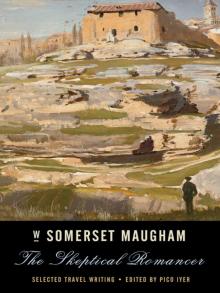 The Skeptical Romancer: Selected Travel Writing
The Skeptical Romancer: Selected Travel Writing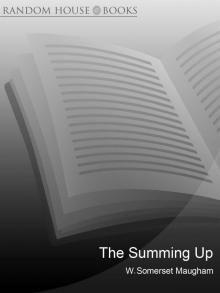 The Summing Up
The Summing Up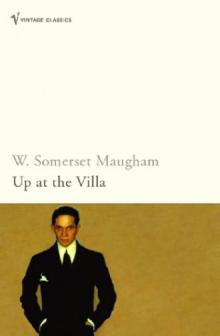 Up at the Villa
Up at the Villa The Razor's Edge
The Razor's Edge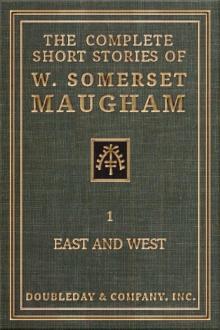 The Complete Short Stories of W. Somerset Maugham: East and West (Vol. 1 of 2))
The Complete Short Stories of W. Somerset Maugham: East and West (Vol. 1 of 2))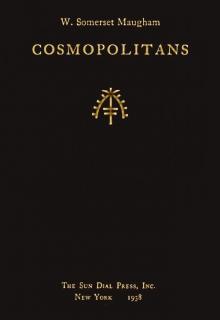 Cosmopolitans
Cosmopolitans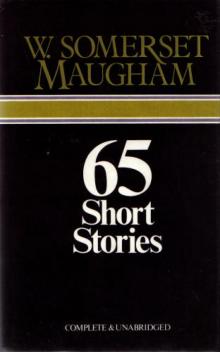 65 Short Stories
65 Short Stories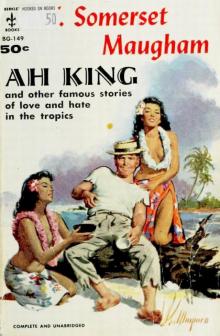 Ah King (Works of W. Somerset Maugham)
Ah King (Works of W. Somerset Maugham)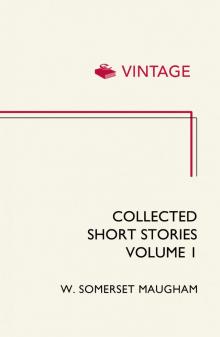 Collected Short Stories: Volume 1
Collected Short Stories: Volume 1 Collected Short Stories Volume 2
Collected Short Stories Volume 2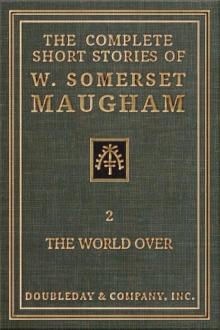 The Complete Short Stories of W. Somerset Maugham - II - The World Over
The Complete Short Stories of W. Somerset Maugham - II - The World Over Collected Short Stories Volume 4
Collected Short Stories Volume 4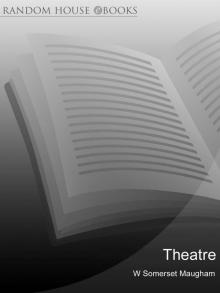 Theatre
Theatre Short Stories
Short Stories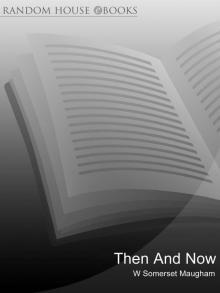 Then and Now
Then and Now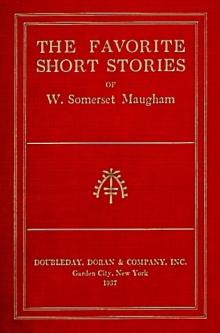 The Favorite Short Stories of W. Somerset Maugham
The Favorite Short Stories of W. Somerset Maugham Of Human Bondage
Of Human Bondage The Magician
The Magician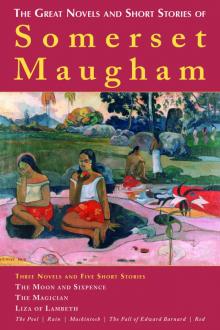 The Great Exotic Novels and Short Stories of Somerset Maugham
The Great Exotic Novels and Short Stories of Somerset Maugham A Writer's Notebook
A Writer's Notebook Christmas Holiday
Christmas Holiday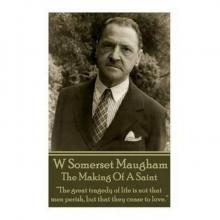 The Making of a Saint
The Making of a Saint Merry Go Round
Merry Go Round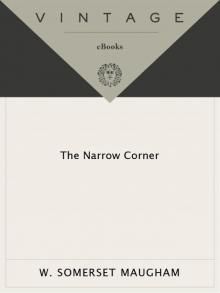 The Narrow Corner
The Narrow Corner Collected Short Stories Volume 3
Collected Short Stories Volume 3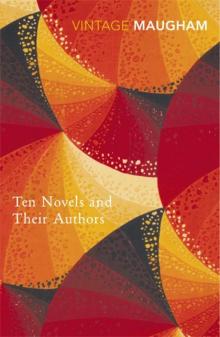 Ten Novels and Their Authors
Ten Novels and Their Authors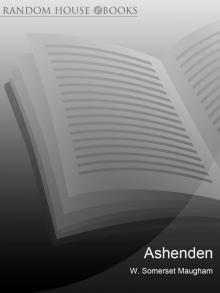 Ashenden
Ashenden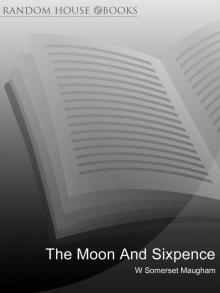 The Moon and Sixpence
The Moon and Sixpence Cakes and Ale
Cakes and Ale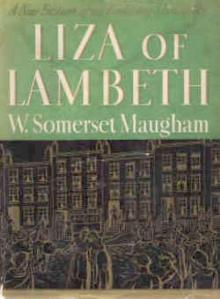 Liza of Lambeth
Liza of Lambeth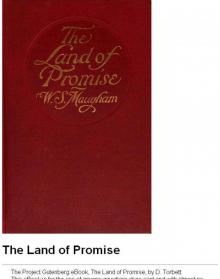 The Land of Promise: A Comedy in Four Acts (1922)
The Land of Promise: A Comedy in Four Acts (1922) A Writer's Notebook (Vintage International)
A Writer's Notebook (Vintage International)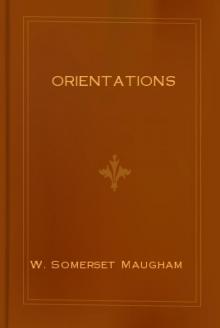 Orientations
Orientations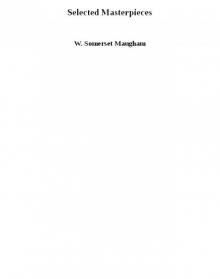 Selected Masterpieces
Selected Masterpieces Mrs Craddock
Mrs Craddock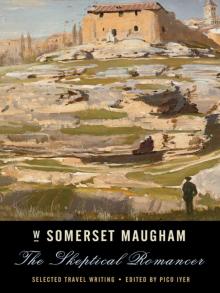 The Skeptical Romancer
The Skeptical Romancer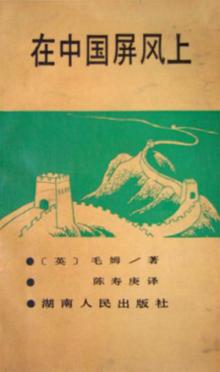 On a Chinese Screen
On a Chinese Screen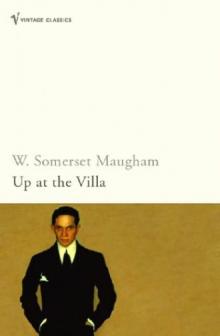 (1941) Up at the Villa
(1941) Up at the Villa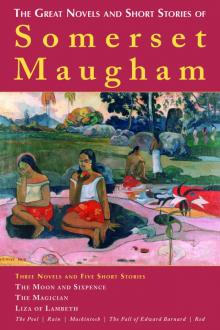 The Great Novels and Short Stories of Somerset Maugham
The Great Novels and Short Stories of Somerset Maugham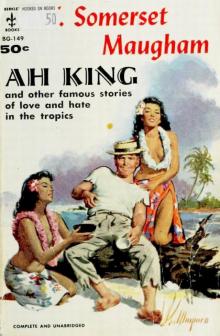 Ah King
Ah King The Explorer
The Explorer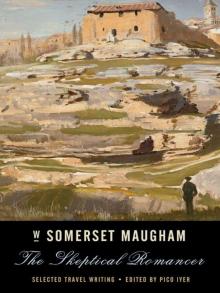 The Skeptical Romancer: Selected Travel Writing (Vintage Departures)
The Skeptical Romancer: Selected Travel Writing (Vintage Departures)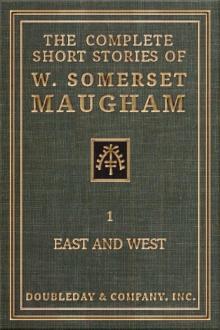 The Complete Short Stories of W. Somerset Maugham - I - East and West
The Complete Short Stories of W. Somerset Maugham - I - East and West